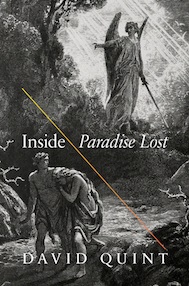Shortlisted for the 2015 Christian Gauss Award
By Louis J. Kern
This volume presents a magisterial reading of Milton’s great epic poem that moves beyond postmodernist intertextuality to uncover the poet’s self-reflective dialog with precedent epic tradition, theological interpretation, and biblical exegesis. Quint’s analysis of the text is grounded in an exhaustive survey and explication of Milton’s allusive use of earlier heroic poetry to authenticate his claim to the title of new epic poet, to provide textual density and internal logic tying the poem’s twelve books together, and to afford pleasure to the diligently attentive reader. While the primary superstructure of the poem rests on classical models—Virgil’s Aeneid and less centrally Homer’s Odyssey—Quint explores Milton’s use of a wide range of texts ranging from the classic—Ovid’s Metamorphoses and Hesiod’s Theogony, Renaissance epics—Dante’s La Divina Commedia, Ariosto’s Orlando furioso, Tasso’s Gerusalemme liberata and Spencer’s Faerie Queene, Neoplatonic philosophy, contemporary scientific works of Galileo Galilei and Francis Bacon, and, by way of exegesis, theological, biblical, and apocryphal texts.
Milton’s use of these materials, Quint demonstrates, constitutes a recursive, ironic thematic inversion that radically revises both epic and biblical accounts. Milton subverts the traditional epic’s military hero and its emphasis on war and empire, supplanting them with a bourgeois hero sustained by individual purity and a commonwealth characterized by liberty and equality. It is Satan who is the archetypal epic hero for Milton, as the inventor of the cannon, war, and monarchy, and as spiritual destroyer, father of Sin and Death. Quint relates Milton’s vision here to his personal experience as republican pamphleteer of the Revolution, Commonwealth bureaucrat, and defender of personal liberty, champion of “a free commonwealth….the noblest,….the equallest, the justest government, the most agreeable to all due liberty and proportioned equality, both human, civil, and Christian….“ (The Ready and Easy Way to Establish a Free Commonwealth, 1660).
Theologically, Milton’s views were heterodox, proximally Arminian; he essentially denied the “divinity or unity of essence” of the Trinity (The Christian Doctrine, Chap. VI, 1675). At the same time, he attacked the heliocentric theophany of the Neo-Plationists from the perspective of the New Science of Copernicus, and the mundane, agnostic cosmogonic system of Lucretius’ De rerum natura as the antithesis of his Christian epic.
Paradise Lost embodies a revisionary re-imagining of the Fall that recuperates human free will within the tradition of Calvinist predestination, and establishes sexual love and companionship as instituted in marriage as the foundation of both civil and religious comity. Despite some obviously misogynistic passages, Quint demonstrates that Milton represented Eve as co-heroic presence in the epic and stresses the pair’s choice to freely sin and freely die. Their choice, the “fortunate Fall,” empowers the blood sacrifice of Christ and the prospect of universal human redemption.
Quint alludes to Milton’s role as apologist for regicide and partisan of the Commonwealth in his prose works, but given the centrality he assigns to marriage in Paradise Lost, the author does not sufficiently explore the roots of Milton’s four controversial divorce tracts (1643-45) advocating separation for emotional incompatibility and their relation to his early abandonment by Mary Powell, his first wife (1642-45). Minor quibbles aside, Quint’s detailed analysis of the internal structure and deeply allusive connections of Paradise Lost to classical epic models as well as to contemporary scientific developments and political and religious controversies, both social and personal, is in itself a refreshingly original approach to the poem. This comprehensive work, full of striking insights, is an essential addition to the library of Milton scholarship.
Louis J. Kern (ΦBK, Clark University,1965) is Professor of History Emeritus at Hofstra University. Hofstra University is home to the Omega of New York Chapter of Phi Beta Kappa.




